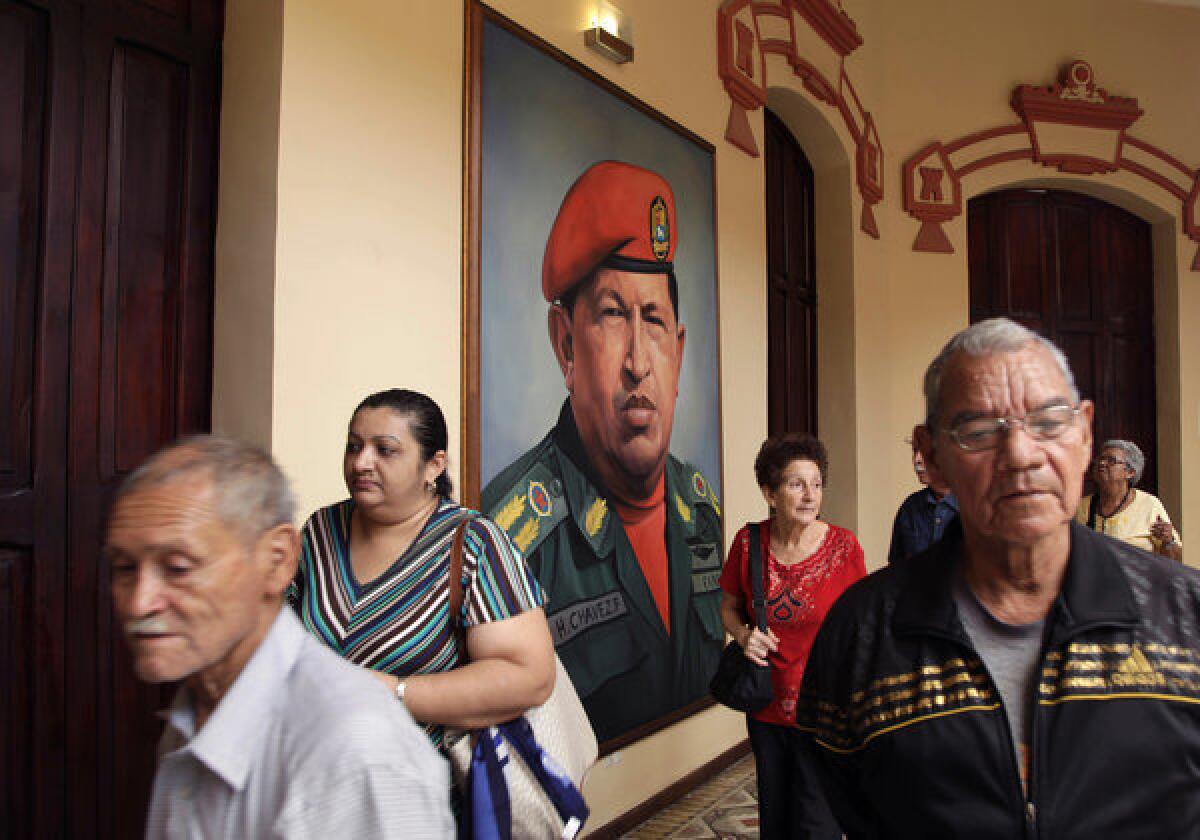Hugo Chavez’s voodoo economics

- Share via
Two years before his death, Hugo Chavez tried to repeal the law of supply and demand, which says that free markets set the price: the higher the demand, the higher the price. Every producer who was willing to sell at that equilibrium price would be able to do so and every consumer willing and able to pay that price could acquire the product.
Chavez despised the law because he believed it robbed the poor and unjustly profited producers. In its place, he persuaded the Venezuelan legislature to enact the 2011 Law on Fair Costs and Prices, a price-setting mechanism to ensure greater social justice. A newly created National Superintendency of Fair Costs and Prices was empowered to establish fair prices at both the wholesale and retail levels. More than 500,000 price edicts have been issued. Companies that violate these price controls are subject to fines, seizures and expropriation.
In all cases, the prices set by the government have been below market — sometimes far below. This has caused production cutbacks, market shortages, massive government subsidies, runaway inflation and extraordinary government intervention. The most flagrant subsidy is for gasoline. Venezuelans pay only 4 to 6 cents per gallon for gasoline, the cheapest in the world. But it costs Petroleos de Venezuela, the government-owned oil company, close to $2 a gallon to extract, refine and distribute it. With domestic consumption now running about 600,000 barrels a day, the financial loss on subsidized oil is roughly $20 billion a year.
CARTOONS: The quotable Hugo Chavez
Worse yet, rising domestic consumption combined with declining domestic production has squeezed oil exports, depriving Venezuela of much-needed hard-currency income. When the government tried to raise gasoline prices years ago, riots erupted. Since then, the government’s only lever for curbing gasoline consumption has been exhortation.
Because Venezuela is still one of the world’s biggest oil producers, the artificially low price of gasoline hasn’t caused any domestic shortages. That is not the case, however, with other consumer products. The wholesale price of coffee beans was fixed in 2003. As rising production costs eventually made coffee farming unprofitable, growers cut back on planting. Chavez responded by expropriating the largest Venezuelan coffee producer and taking a 50% stake in another. The government now controls nearly 80% of coffee production, with small farms supplying the rest.
Despite this intervention, Venezuela doesn’t produce enough coffee to meet domestic demand. The nation has been transformed from a coffee exporter to a coffee importer. Last year the government had to import more than 80 million pounds of coffee (600,000 bags) to help bridge the gap between the quantity demanded and the quantity supplied. Even at that, consumers line up early at government-run stores when coffee deliveries are anticipated.
The same kind of acute shortage bedevils the corn flour market. Bread prices are set artificially low to ensure that everyone can afford it. So is the price of corn flour. When bakeries can get some corn flour, however, they want to use it to produce higher-priced products such as specialty breads, not low-priced shelf bread. Shortages of both corn flour and bread result. In the black market, corn flour prices have been 50% above government price ceilings. The government has responded by accusing flour distributors of hoarding and by seizing their inventories for distribution to the people.
Last year, Chavez extended the Law on Fair Costs and Prices to rental housing. Previous rent controls and limits on private investment had reduced the stock of rental housing by as much as 70% in only a few years. The acute shortage of rental housing led to skyrocketing rents in the black market and a lot of social unrest. Chavez decided that tougher rent control was needed. In November the government decreed that rents could not exceed a specified percentage of a property’s market value. The property value, of course, would be determined by the government’s Superintendency of Fair Costs and Prices. The housing shortage can only get worse.
In response to the growing housing shortage, the government decided to help increase the housing stock. It’s goal is to build 3 million homes by 2019. But rent controls make new construction unprofitable and conventional financing unlikely. So the government recently enacted a mandatory loan program that fixes mortgage rates at very low levels: 4.33% for low-income borrowers and 10.66% for high-income borrowers. In an economy with inflation running at nearly 25% a year and rising, this is the epitome of free money. Naturally, no private bank would want to make such loans. But the new law requires banks to devote a significant portion of their loan portfolio to these mandatory mortgage loans.
Venezuela’s attempt to repeal the law of supply and demand and replace it with pervasive price controls has been an economic disaster. The destruction of profit, investment and work incentives has stymied economic growth. The government and the economy have become increasingly dependent on a diminishing stream of oil revenue. Without that oil revenue, the Venezuelan economy would implode.
Chavez’s death has sparked hope of an economic restructuring that would reduce government regulation and encourage private enterprise. But that will not happen any time soon. Chavez’s handpicked successor, Nicolas Maduro, must win the hearts and trust of the people. As Chavez himself learned on several occasions, rescinding price controls and embracing “capitalistas” is not the way to accomplish that goal.
Brad Schiller is emeritus professor of economics, American University. Email: bschill@american.edu
More to Read
A cure for the common opinion
Get thought-provoking perspectives with our weekly newsletter.
You may occasionally receive promotional content from the Los Angeles Times.









